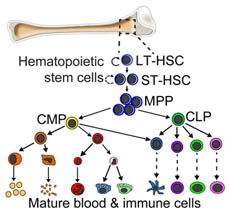Professor: Mary L. Kraft
University of Illinois
600 S Mathews Ave
208 RAL, MC-712
Urbana, IL 61801
phone: 217-333-2228
e-mail: mlkraft@illinois.edu
Engineering Microscale Culture Platforms for Noninvasively Screening Hematopoietic Stem Cell Fate Decisions
The ability to distinguish and identify individual cells from different subtype s is critical to a number of medical, engineering, and environmental studies. This includes discriminating cancerous and healthy cells at various locations in a tissue, identifying the species of microbes in a co-culture, as well as our focus, determining the maturation stage of stem cells in ex vivo cultures. Due to the scarcity of stem cells in the body, single cell identification tools are desired to minimize the number of rare stem cells that must be screened to identify the conditions for inducing stem cell quiescence, self-renewal, or differentiation into specific lineages in culture. We are developing approaches that combine multivariate analysis with chemically specific data to identify the fate decisions that occur durring hematopoietic stem cell differentiation. We work closely with Prof. Brendan Harley's tissue engineering laboratory to engineer a microscale platform that enables noninvasively tracking the fate decisions of individual living hematopoietic stem cells within an artificial bone marrow niche.
s is critical to a number of medical, engineering, and environmental studies. This includes discriminating cancerous and healthy cells at various locations in a tissue, identifying the species of microbes in a co-culture, as well as our focus, determining the maturation stage of stem cells in ex vivo cultures. Due to the scarcity of stem cells in the body, single cell identification tools are desired to minimize the number of rare stem cells that must be screened to identify the conditions for inducing stem cell quiescence, self-renewal, or differentiation into specific lineages in culture. We are developing approaches that combine multivariate analysis with chemically specific data to identify the fate decisions that occur durring hematopoietic stem cell differentiation. We work closely with Prof. Brendan Harley's tissue engineering laboratory to engineer a microscale platform that enables noninvasively tracking the fate decisions of individual living hematopoietic stem cells within an artificial bone marrow niche.
We have demonstrated that confocal Raman microspectroscopy enables acquiring biochemical spectral signatures from individual living cells at specific locations within a microscale culture platform without compromising cell viability. We recently established that the biochemical signatures contained in these single-cell Raman spectra can be translated into the differentiation states of individual hematopoietic cells isolated from mouse bone marrow using multivariate analysis (Ilin et al. Analytical Chemistry 2015). This label-free and location-specific approach enables noninvasively identifying hematopoietic cell differentiation stage with far less ambiguity than current immunolabeling approaches.
Now we are developing Raman-compatible noninvasive microscale sceening platforms that enable noninvasively tracking the fate decisions that hematopoietic stem cells and their progeny make in response to cues from the bone marrow niche. We are also engineering a microscale platform for probing the cell-to-cell heterogeneity within the rarest, most primitive, and most clinically useful hematopoietic cell populations. Researchers working on this interdisciplinary project learn to solve open-ended research challenges while developing expertise in state-of-the-art fabrication strategies, polymer chemistry, soft materials characterization, cell biology, Raman microspectroscopy, and computational methods. The computational component of this project focuses on modeling the spectra with multivariate analyses, including partial least-squares discriminant analysis, self-organizing maps, machine learning algorithms, and design of experiments.
This research is expected to yield highly efficient microscale culture platforms for efficiently identifying the cues in the bone marrow niche that enable directing the fate decisions of hematopoietic stem cells in vitro. Such platforms are expected to faclitate efforts to identify the combinations of cues that enable the expansion of hematopoietic stem cells outside the body for disease treatment.